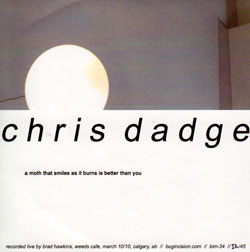
The records (and tapes) from label Bug Incision all retain an innocence of invention and unpredictability. Sure the artists probably spend plenty of time behind the scenes in their labs, but the results imagine as a coarsely exciting physical and emotional set of investigations.
In the case of A Moth That Smiles As It Burns Is Better Than You, Chris Dadge (also one half of Bent Spoon Duo) threw this live set of improvised violin, acoustic guitar and myriad percussion together "at the last minute". For nearly twenty-three minutes, Dadge wrangles everything within reach into a deft octodextrous mélange, nagging this reviewer to query the label about the conspiracy of a secret post-gig overdub session (nope, all live). Scratching, droning, plucking violin with the right hand and feverish taps on bells, rims and wooden objects with the other, Dadge can juggle a hurricane. He exploits every angle and sonic possibility of each instrument, focusing as much on, for example, the potential of a snare drum: bouncing sticks on the head while depressing the springs lever is interesting, but add fingernail scratches and rubber beaters and slamming dinner bells and coaxed melodies from the squeaks of the lever mechanism, then stretch the membrane and you're near Dadge's universe — or microcosm, as this type of gesture might endure a ten-second shelf life before he jumps to another (and of course each of his limbs are in simultaneous realization of wringing a guitar neck and creating natural delays via cymbals moved near, then away from a microphone etc.)
With some musicians, this wall-splat of idea after idea tires. But while some ramble, Dadge expounds. He simply never ceases with his conjuration act of stunted thoughts and elision that give way to even more attractive designs
While a methodology is a nice way to nudge orientation, free improvising musicians who spend too long in rehearsal can end up sounding...rehearsed. It's called improvisation for a reason: you're supposed to be making stuff up. Shouldn't the searches between the cracks be the crux of the performance? Isn't communion with space, time, your instrument(s) and the direction they take you more important than fixed forms and scales? Complicated questions — ones that Dadge understands and capably answers with solid, literal riposte.
Comments and Feedback:
|



